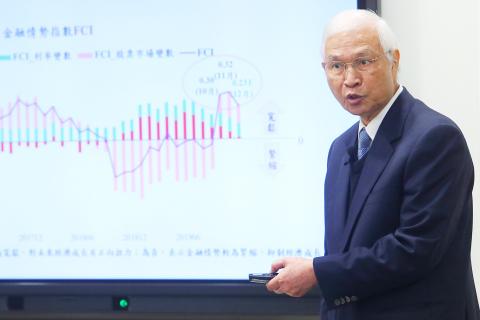The central bank yesterday kept its rediscount rate unchanged at 1.375 percent for the 14th consecutive quarter, saying there is still room for the nation’s economy to improve, as inflation remains benign.
The move was in line with the stance of major central banks, which have embarked on monetary easing to cushion the impact of the US-China trade dispute, geopolitical frictions and other downside risks.
“The negative output gap, which now stands at 0.34 percent, could widen to 0.42 percent next year,” bank Governor Yang Chin-long (楊金龍) told a news conference in Taipei after a board meeting.

Photo: CNA
The output gap — the difference between actual GDP and potential GDP — has topped the list of the bank’s concerns when it sets policy rates on a quarterly basis.
An accommodative monetary stance is warranted as the global economy remains fragile, Yang said.
The economic slowdown in China — which absorbs about 40 percent of Taiwanese exports — could worsen next year, despite a tentative trade agreement with the US, Yang said.
Taiwan should continue to benefit from trade rerouting and order transfers, with the nation’s GDP forecast to rise 2.6 percent this year and 2.57 percent next year, the governor said.
Both readings represent a modest upgrade from the bank’s projection three months earlier, but are less upbeat compared with the Directorate-General of Budget, Accounting, and Statistics’ forecasts of 2.64 percent growth this year and 2.72 percent next year.
“We are less optimistic about the size of private investment,” Yang said.
The governor confirmed that the bank had repeatedly intervened in the foreign-exchange market, often at the end of the trading session, to stem the pace of appreciation of the local currency.
It is the bank’s duty to maintain stability and order in the financial market, and intervention is sometimes necessary to achieve that goal, he said.
An influx of hot money has pushed the New Taiwan dollar up 3.83 percent against the US dollar since August, the bank’s data showed.
Yang added that property transactions have regained momentum, especially for residential housing in central and southern Taiwan, as well as for land and office prices nationwide.
Several board members shared the observation and local banks are generally positive about a continued recovery, Yang said.
However, the market has not evolved to such an extent that credit control measures are merited, he said.
The bank expects consumer prices to grow a mild 0.54 percent this year and climb to 0.77 percent next year, allowing room for monetary easing.

Taiwan’s long-term economic competitiveness will hinge not only on national champions like Taiwan Semiconductor Manufacturing Co. (TSMC, 台積電) but also on the widespread adoption of artificial intelligence (AI) and other emerging technologies, a US-based scholar has said. At a lecture in Taipei on Tuesday, Jeffrey Ding, assistant professor of political science at the George Washington University and author of "Technology and the Rise of Great Powers," argued that historical experience shows that general-purpose technologies (GPTs) — such as electricity, computers and now AI — shape long-term economic advantages through their diffusion across the broader economy. "What really matters is not who pioneers

In a high-security Shenzhen laboratory, Chinese scientists have built what Washington has spent years trying to prevent: a prototype of a machine capable of producing the cutting-edge semiconductor chips that power artificial intelligence (AI), smartphones and weapons central to Western military dominance, Reuters has learned. Completed early this year and undergoing testing, the prototype fills nearly an entire factory floor. It was built by a team of former engineers from Dutch semiconductor giant ASML who reverse-engineered the company’s extreme ultraviolet lithography (EUV) machines, according to two people with knowledge of the project. EUV machines sit at the heart of a technological Cold

Taiwan Semiconductor Manufacturing Co (TSMC, 台積電) last week recorded an increase in the number of shareholders to the highest in almost eight months, despite its share price falling 3.38 percent from the previous week, Taiwan Stock Exchange data released on Saturday showed. As of Friday, TSMC had 1.88 million shareholders, the most since the week of April 25 and an increase of 31,870 from the previous week, the data showed. The number of shareholders jumped despite a drop of NT$50 (US$1.59), or 3.38 percent, in TSMC’s share price from a week earlier to NT$1,430, as investors took profits from their earlier gains

TAIWAN VALUE CHAIN: Foxtron is to fully own Luxgen following the transaction and it plans to launch a new electric model, the Foxtron Bria, in Taiwan next year Yulon Motor Co (裕隆汽車) yesterday said that its board of directors approved the disposal of its electric vehicle (EV) unit, Luxgen Motor Co (納智捷汽車), to Foxtron Vehicle Technologies Co (鴻華先進) for NT$787.6 million (US$24.98 million). Foxtron, a half-half joint venture between Yulon affiliate Hua-Chuang Automobile Information Technical Center Co (華創車電) and Hon Hai Precision Industry Co (鴻海精密), expects to wrap up the deal in the first quarter of next year. Foxtron would fully own Luxgen following the transaction, including five car distributing companies, outlets and all employees. The deal is subject to the approval of the Fair Trade Commission, Foxtron said. “Foxtron will be